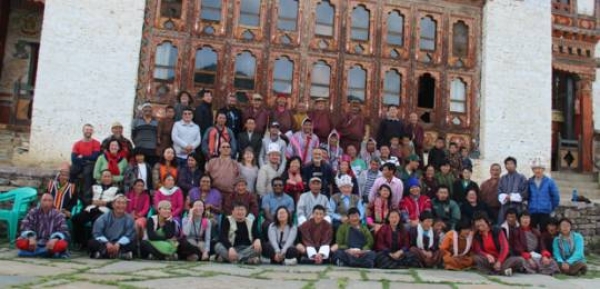Indigenous mountain communities call on governments to support traditional knowledge-based adaptation

An International Network of Mountain Indigenous Peoples has been formed in order to exchange seeds and knowledge to achieve food sovereignty and climate change adaptation in mountain environments, and to advocate for community biocultural heritage rights.
The network was formed at a walking workshop which took place in Bhutan from 26 May to 1 June 2014. Twenty-five indigenous mountain communities from 10 countries met to discuss the impacts of climatic changes on their food and farming systems and the adaptation responses needed.
Climate change threatens mountain ecosystems and the people that depend on them for their livelihoods. All the communities that participated are already experiencing adverse climatic changes – increased temperatures, erratic rainfall, more extreme events (e.g. drought and typhoons) and increased pests and diseases.
The communities from Peru, Bhutan and China had already agreed to exchange seeds at a meeting in Peru last month, to increase the chances of producing food in the face of more extreme weather. The International Potato Center has agreed to facilitate the seed exchange.
At the Bhutan workshop, the agreement to exchange seeds was extended to the other communities in the network – from India, Kyrgyzstan, Tajikistan, Taiwan, Thailand, the Philippines and Papua New Guinea. The network also developed the "Bhutan Declaration on Climate Change and Mountain Indigenous Peoples".
The declaration calls on governments to support adaptation based on traditional knowledge that is specific to local contexts, and to respect indigenous peoples' world views and cultural and spiritual values that lie at the heart of their adaptive capacity.
In the International Year of Family Farming, the Bhutan declaration also calls on governments to support traditional family farmers given their critical role in conserving crop diversity for national food security, and urges them to integrate traditional knowledge into sectoral policies, plans and programs.
The Intergovernmental Panel on Climate Change (IPCC) states that the impacts of climate change increase with altitude. This means that mountain ecosystems are the first to be affected and will experience the most severe changes. The 5th IPCC report also recognises the role and value of local and traditional knowledge in climate change adaptation, while noting that such knowledge is often not included in adaptation planning.
The Bhutan declaration calls for the promotion of indigenous languages as living libraries of critical traditional knowledge associated with mountain ecosystems. It also calls for support for bridging traditional knowledge and science to create effective solutions for agro-biodiversity conservation, food security and climate adaptation; and for the full implementation of the UN Declaration on the Rights of Indigenous Peoples.
Governments are urged to support exchanges of knowledge, innovation and technology among indigenous and traditional mountain communities, so that solutions to common challenges can be identified; and to support seed exchanges and the repatriation of seeds from international gene banks to farmers' fields as a critical strategy for food security.
The walking workshop in Bhutan was co-organised by Asociacion ANDES, IIED, the International Society for Ethnobiology and the National Biodiversity Centre of Bhutan.
- ► Download the Bhutan Declaration on Climate Change and Mountain Indigenous Peoples.
- ► More information: The Mountain Communities Initiative
Contact:
- Alejandro Argumedo Alejandro@andes.org.pe
- Krystyna Swiderska Krystyna.swiderska@iied.org

Facebook comments